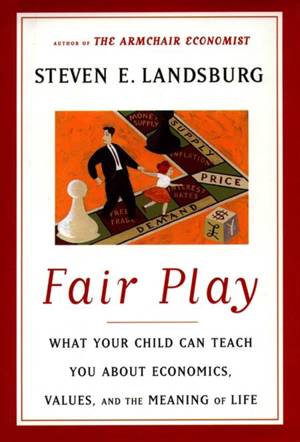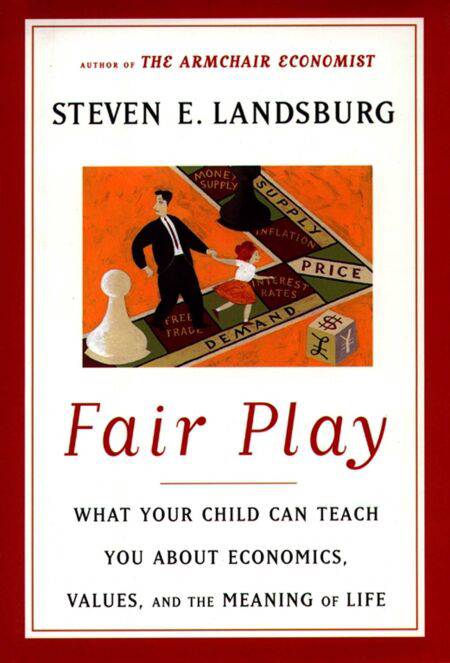
- Retrait gratuit dans votre magasin Club
- 7.000.000 titres dans notre catalogue
- Payer en toute sécurité
- Toujours un magasin près de chez vous
- Retrait gratuit dans votre magasin Club
- 7.000.0000 titres dans notre catalogue
- Payer en toute sécurité
- Toujours un magasin près de chez vous
Fair Play EBOOK
What Your Child Can Teach You About Economics, Values, and the Meaning of Life
Steven E. Landsburg
Ebook | Anglais
11,17 €
+ 11 points
Description
With his witty and instructive book The Armchair Economist, Steven Landsburg won popularity and acclaim by using economics to illuminate the mysteries of daily life, and using daily life to illuminate the mysteries of economics.
Now Landsburg returns to address fundamental issues like fairness, tolerance, morality and justice—issues that are as important on the playground as they are in the marketplace. With the help of his daughter, Cayley, he contrasts the wisdom of parents with the wisdom of economists—not always to the credit of the latter.
How should we feel about taxes that redistribute income? Ask how parents feel about children who forcibly "redistribute" other children's toys. How should we respond to those who complain that their neighbors are too wealthy? Ask how parents respond when children complain that their siblings got too much cake. By insisting that fairness can't mean one thing for children and another for adults, Landsburg shows that the instincts of the parent have profound consequences for economic justice.
Along the way, Landsburg—with his customary sharp wit and challenging logic—pauses to reflect on an astonishing variety of issues in economic theory, the philosophy of parenting, the true nature of family values, and how to get the most out of life. He uses parent-child interactions to explain the economics of free trade and immigration, progressive taxation, minimum wages, racial discrimination, and the role of money. He makes the best possible philosophical cases for and against progressive taxation, and weighs them against the wisdom of the playground. He explains why children are a good thing, and why economic theory tells us we don't have enough of them. He meditates on the role of authority in our lives, the effects of cultural bias, and why it's important to read poetry to your children. This lively and entertaining book will inform and delight readers who have forgotten the human side of the dismal science.
Now Landsburg returns to address fundamental issues like fairness, tolerance, morality and justice—issues that are as important on the playground as they are in the marketplace. With the help of his daughter, Cayley, he contrasts the wisdom of parents with the wisdom of economists—not always to the credit of the latter.
How should we feel about taxes that redistribute income? Ask how parents feel about children who forcibly "redistribute" other children's toys. How should we respond to those who complain that their neighbors are too wealthy? Ask how parents respond when children complain that their siblings got too much cake. By insisting that fairness can't mean one thing for children and another for adults, Landsburg shows that the instincts of the parent have profound consequences for economic justice.
Along the way, Landsburg—with his customary sharp wit and challenging logic—pauses to reflect on an astonishing variety of issues in economic theory, the philosophy of parenting, the true nature of family values, and how to get the most out of life. He uses parent-child interactions to explain the economics of free trade and immigration, progressive taxation, minimum wages, racial discrimination, and the role of money. He makes the best possible philosophical cases for and against progressive taxation, and weighs them against the wisdom of the playground. He explains why children are a good thing, and why economic theory tells us we don't have enough of them. He meditates on the role of authority in our lives, the effects of cultural bias, and why it's important to read poetry to your children. This lively and entertaining book will inform and delight readers who have forgotten the human side of the dismal science.
Spécifications
Parties prenantes
- Auteur(s) :
- Editeur:
Contenu
- Nombre de pages :
- 240
- Langue:
- Anglais
Caractéristiques
- EAN:
- 9781451658767
- Date de parution :
- 20-06-11
- Format:
- Ebook
- Protection digitale:
- Adobe DRM
- Format numérique:
- ePub

Les avis
Nous publions uniquement les avis qui respectent les conditions requises. Consultez nos conditions pour les avis.






